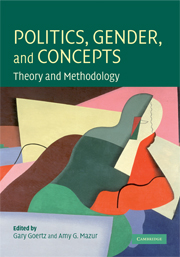Book contents
- Frontmatter
- Contents
- List of figures
- List of tables
- Notes on contributors
- Acknowledgments
- 1 Introduction
- 2 Mapping gender and politics concepts: ten guidelines
- Part I Gendering Concepts
- 3 Gendering democracy
- 4 Gendering representation
- 5 Gendering the welfare state
- 6 Gendering governance
- 7 Gendering development
- Part II Gender-Specific Concepts
- Appendix: A website for additional gender and politics concepts
- References
- Index
5 - Gendering the welfare state
Published online by Cambridge University Press: 06 July 2010
- Frontmatter
- Contents
- List of figures
- List of tables
- Notes on contributors
- Acknowledgments
- 1 Introduction
- 2 Mapping gender and politics concepts: ten guidelines
- Part I Gendering Concepts
- 3 Gendering democracy
- 4 Gendering representation
- 5 Gendering the welfare state
- 6 Gendering governance
- 7 Gendering development
- Part II Gender-Specific Concepts
- Appendix: A website for additional gender and politics concepts
- References
- Index
Summary
The concept of the welfare state can trace its origins to World War II and the politics of persuasion. After an interlude of consensus the welfare state became the source of political controversy and continual debate. Despite this, or perhaps because of it, welfare state research stands out as one of the most productive areas in comparative political analysis in the accumulation of social science knowledge. The research has often been problem-or question-driven (Pierson 2000), and a major strength has been its political and social relevance. Simultaneously, many prominent scholars in the field have lamented the sorry condition of the welfare state as a social science concept, noting that “the welfare state … has generally received scant conceptual attention” (Esping-Andersen 1990: 18). Thus it is not entirely surprising that the conceptual venture of gendering the welfare state has concentrated on incorporating gender into the comparative analysis of welfare states rather than reformulating the concept itself. Nevertheless, gendering comparative welfare state research has altered the concept of the welfare state.
This chapter begins with an examination of the concept of the welfare state, using several of the guidelines discussed in chapter 2; the purpose of this introduction is to present the concept prior to its gendering. The next section discusses what is meant by gendering and presents different analytical strategies to gender the welfare state.
- Type
- Chapter
- Information
- Politics, Gender, and ConceptsTheory and Methodology, pp. 94 - 113Publisher: Cambridge University PressPrint publication year: 2008
- 6
- Cited by



